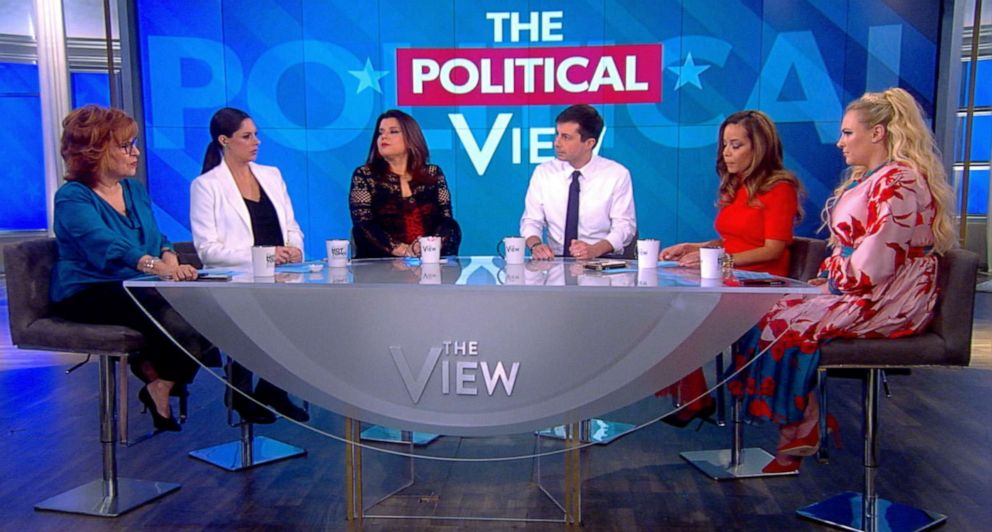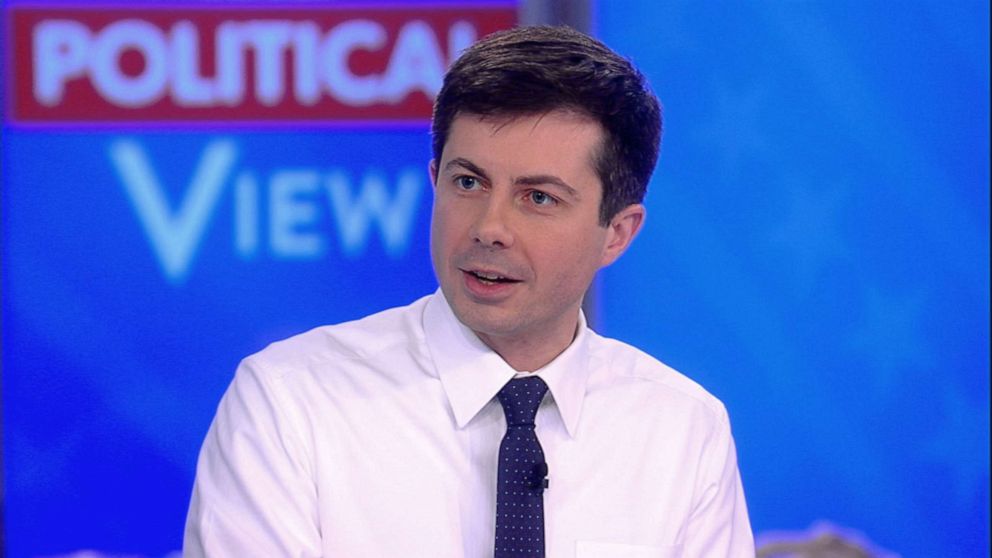On 'The View': 'Mayor Pete' Buttigieg says he wants to reach the 'whole country' in a long-shot bid for president
In the two months since he announced a presidential exploratory committee, Mayor Pete Buttigieg has risen to relative prominence in a crowded 2020 field by appealing to the "whole country," beyond the liberal silos that Democrats tend to focus on in presidential races.
"An election is supposed to be about our whole country and we can't just concentrate on those areas where people, for the most part, already agree with us," he said on ABC's "The View" on Friday. "If they have a somewhat different set of values, if they know what you have to say is coming from a place of values, I think you get a lot of credit for that."
The South Bend, Indiana, mayor is gaining traction in the early stages of a primary season with 15 contenders competing for the Democratic nomination by showcasing a blend of Midwestern values and robust policy acumen to back his long-shot bid. While Buttigieg might still be a lesser-known candidate, this week he earned a spot on the stage at the first Democratic debate after surpassing the 65,000 donor threshold to qualify.
Although he hasn't formally announced his candidacy, the 37-year-old said he believes he can attract voters open to "different voices" with "authenticity."
"My generation really puts a premium on authenticity," Buttigieg asserted. "I think you have a much better chance of reaching -- and of course we want to reach out to conservatives, too, not by tricking them and pretending to be more -- if I'm not aligned with somebody to where they shouldn't vote for me because I don't represent their values, then fine, but I'd like to reach more conservatives who just might for the first time in a long time -- because the Republican party went through this hostile takeover by the current president -- just might be open to different voices and different candidates."
Buttigieg's early push comes as the expected entrance of former Vice President Joe Biden looms over the race. CNN reported on Monday that Biden discussed with advisers the possibility of choosing a running mate early in the primary to "keep the focus of the primary fight on the ultimate goal of unseating Trump." The close advisers are considering pre-packaging a ticket with Stacey Abrams as his vice president, according to Axios.
"Abrams continues to keep all options on the table for 2020 and beyond,” Abrams' spokesperson Lauren Groh-Wargo said in a statement to ABC News. “She has met with over half a dozen presidential contenders to discuss their commitment to voting rights and to investing in Georgia."
During his Friday interview, Buttigieg dismissed the theory behind that speculation when asked about picking a vice president right out of the gate, but signaled he supported a gender-balanced ticket.
"I don't speak for anybody else but it would definitely feel presumption if I did it," he said. "I don't think you rule anybody in and out decisively. First of all, you got to get there. There's research on companies that's shown that when a company has more gender balance in it's leadership, it's more profitable. If that's true for companies, I bet you that's true for countries."
The former Navy intelligence officer could make history as the nation's first openly gay presidential nominee of a major party. He was the first openly-gay executive in Indiana history.
Buttigieg came out publicly in a 2015 essay in the South Bend Tribune, less than two weeks before the U.S. Supreme Court legalized same-sex marriage nationally in the case of Obergefell v. Hodges.
"When I came out ... it was 2015. We were in the middle of a reelection campaign," Buttigieg said. "It was not obvious that that was going to be a safe thing to do. It was in Indiana. Mike Pence was the governor at the time, and I wound up getting re-elected with 80 percent of the vote. So I think people will evaluate you for the job that you do."

Despite the historic nature of his candidacy, in the ever-evolving field of 2020 candidates, Buttigieg urged his fellow Democrats to keep voters in the foreground and focus on what they are running for, not against in President Donald Trump.
"Where we could go off the rails is if we see this fountain of negativity because we've lost our minds about the current president, not without reason, right, but it can't be all about him," he said. "If we're always talking about him, then folks at home in the Midwest, for example, are going to say you're not talking about me. So the more we can make it about voters, not who's looking good in the committee hearing or who got the best zinger off on the cable news show. Where I live that's not what decides people's lives."
A graduate of Harvard University and Oxford who has met with former President Barack Obama about his presidential ambitions, Buttigieg also addressed issues and ideas confronting the 2020 hopefuls in the early primary race -- including a proposal on the fringes -- reparations to African-American families hurt by slavery.
"I'm supportive of the concept of acting proactively to right these wrongs," Buttigieg said. "I don't know that -- if it's perceived though as just a check in the mail system, I think we're going to have a hard time coming up with something that everybody can believe is fair."
"Let's be intentional. When we decide how housing money is going to be spent, let's tar got those to neighborhoods that experience red lining," he added before sharing his support for a U.S. House proposal that will set up a commission to look into the idea.
Buttigieg also implied that socialism, which continues to be defined and redefined in American politics, has been weaponized as a "scare tactic" by President Donald Trump and Republicans.
"I think in many ways it's a term that's lost it's meaning because it's being thrown around politically," he said before citing the example of the Affordable Care Act, which he pointed out was initially a proposal by a Republican governor. "I believe that capitalism is this incredibly powerful force that can do a lot of good, but I guess in the same way people talk about democratic socialism, I want to talk about democratic capitalism."
The two-term mayor is ending his week in South Carolina for his first trip to the state since announcing his exploratory committee in January.




